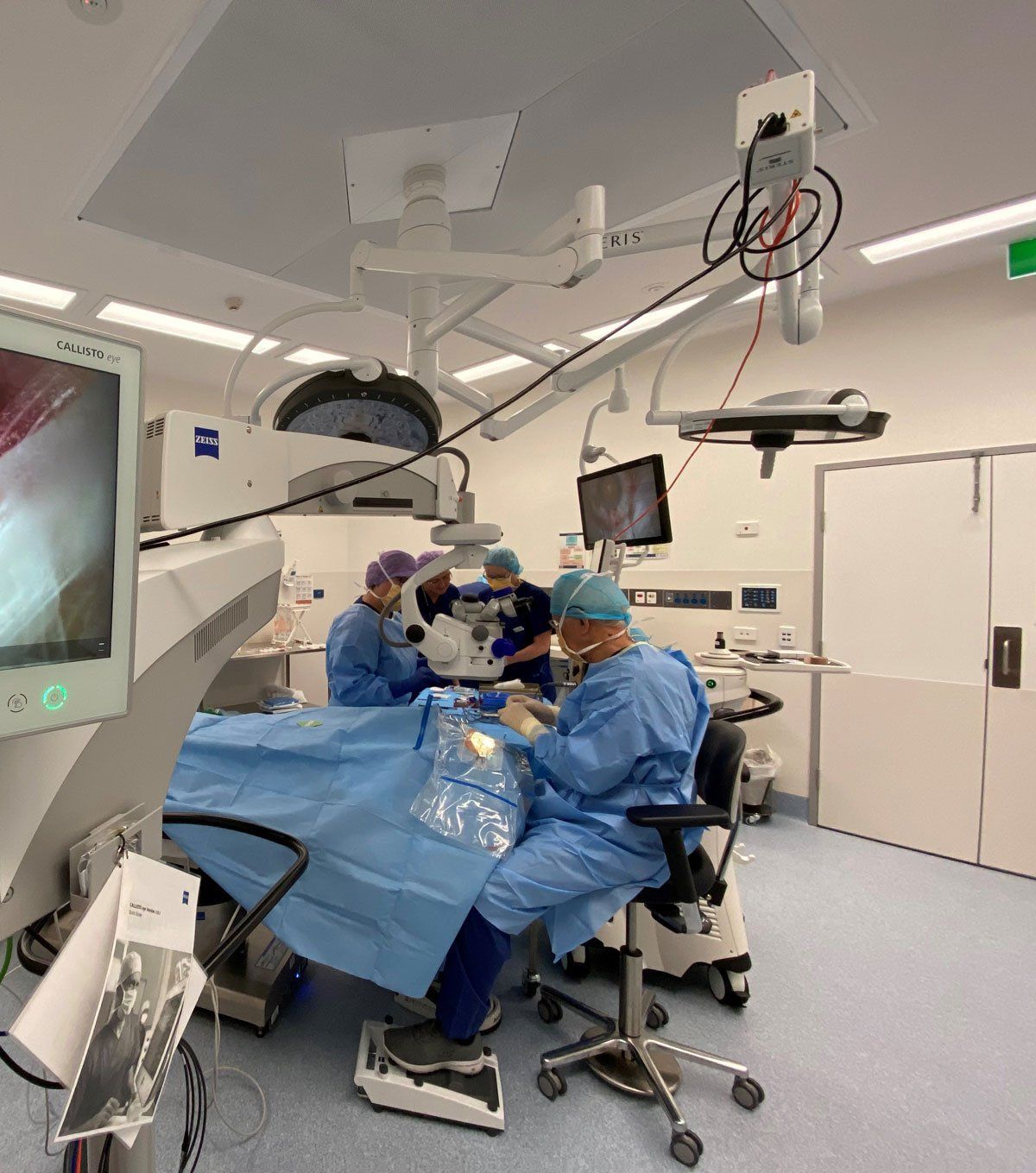Cataract Surgery
- What is a Cataract?
A cataract is an opacification of the natural lens which leads to a decrease in vision. They develop slowly and usually affects both eyes.
Symptons include blurriness, loss of colour perception, double vision and trouble seeing at night. Poor vision caused by cataracts can also increase a patients risk of falling and depression.
- Cataract Surgery
Cataract surgery is usually performed under sedation and local anaesthetic drops.
The surgery itself is not painful and typically only takes 10-15 minutes.
The natural lens of the eye is removed and is replaced by a prosthetic lens.
At Crystal Eye and Laser, various different lens options are offered which includes customised, bespoke lenses that are specifically manufactured for each individual. We are the only centre currently in Perth that offers this service to cataract patients.
- Why Choose Crystal Eye and Laser for Cataract surgery
1. We are formally trained Refractive Surgeons who are able to refine the outcomes of cataract surgery by laser surgery to treat residual optical errors to achieve exceptional results.
2. We work with the best international lens manufacturers
3. Experts in cataract surgery for complex cases
4. We’re recognised by insurers as preferred providers
5.Crystal Eye and Laser surgeons always treat astigmatism
6.We specialise in cataract surgery for people who have had laser eye surgery
- Aftercare and Recovery
Crystal Eye and Laser Centre will provide you with comprehensive aftercare with all the information to care for your eyes after your procedure. We have an extensive post-cataract surgery follow-up regime where patients are followed up at day one, week one, and one month post-surgery. After one month we assess whether any enhancements are required and these will be provided free of charge. Each patient will receive a post-op package which includes the necessary instructions to apply eye drops and the do's and don'ts after cataract surgery. It’s our way of making sure that every patient’s journey to great vision is as successful as possible.
- FAQ’s
Do I have to wait for the cataract to be ripe?
No, once you have a cataract it is your choice whether you want it removed or not. Studies have shown that early cataract removal infact decreases morbidity and extends a patients lifespan. The earlier a cataract is removed the less chances there are of surgical complications and an increased period of good vision.
Do health funds cover cateract surgery?
Yes, all health funds cover cataract surgery. The patient must however make sure that they are covered under their health insurance.
Are there any out-of-pocket costs?
At Crystal Eye and Laser Centre we offer gap free cataract surgery. The patient however will be responsible for an excess payment to their health fund.
What to expect on the day and after cataract surgery?
Cataract surgery is performed as a day surgery procedure. Once you have had your operation you will be discharged to recover at home. An escort will be needed to transport you safely back home. There is no overnight stay in the day hospital required. You will be seen the next day by your surgeon for your post-op assessment.
When can I expect my vision to improve?
For most people visual improvement is within a day and at most within a week. The maximum level of improvement will be after approximately one month.
Will my eye hurt after surgery?
Your eye may feel a little gritty and uncomfortable for a few days after surgery, most patients however feel no discomfort at all. Major discomfort is highly unlikely.
What follow-up appointments are there?
Post cataract surgery patients are followed up at the first day after surgery. There will be a follow-up at one week and one month to assess visual recovery.
Will I still need to wear glasses?
Most patients will not require distance correcting spectacles following cataract surgery. Depending on your choice of lens, reading glasses might still be needed. If a patient has a desire to be more spectacle independent, various options of premium lenses are available to decrease the need for spectacles.
Can my cataract grow back?
No, cataract surgery is a permanent solution and the effects of caratact surgery last a long time. With the majority of patients experiencing good vision.
When can I go back to work after cataract surgery?
You should be able to return to work within a week after cataract surgery.
When can I drive or fly after surgery?
You can drive whenever you feel ready and your vision has cleared. For most people this only takes a few days.
For air travel, we usually recommend you wait at least one week after surgery.
Are there any risk with cataract surgery?
As with any surgery there are risks involved, these risks however are extremely low. Cataract surgery is the most successful operation in the world with the least amount of complications. Your surgeon will discuss all the risks and benefits during your consultation.
So what can I expect?
Day of procedure checklist
- Arrive a few minutes early to your appointment time.
- You will be at our premises for around 2-3 hours.
- Before the operation, you may shower or wash as normal.
- You may like to wash your hair, as it is not recommended that you wash your hair for 2 days after the operation.
- Avoid wearing any make up or perfume, and do not bring any jewellery with you.
- At the time that your appointment or consultation is made, you will be told how long you should fast for.
- You should not wear contact lenses for at least 48 hours before your surgery. Depending on your individual circumstances, you may be asked to use eye drops prior to surgery.
- You may take your usual medications. Bring them with you to the clinic.
- It is recommended that you bring a friend along. They can be present during the operation and are required to drive you home.
What to expect on the day of the procedure
1 Prepping
Prior to the operation, your Anaesthetist will ask you about any previous anaesthetic history and check your heart and blood pressure. A painless local anaesthetic may be applied to your eye, and drops will be administered to dilate the pupil. The skin around your eye will be cleaned.
2 The surgery begins
During the operation, you are likely to feel drowsy due to the sedation. You will hear what is going on around you and feel the surgeon’s hands on your face. Your surgeon will usually explain to you what is going on, whilst the procedure is being performed.
3 During the procedure
Your face and head will be protected by sterile material. Your Anaesthetist will always be on hand to monitor your progress. If you feel any discomfort, you should let the Anaesthetists or surgeon know
4 The experience
For most people, all they feel is a slight pressure and a ‘scratchy’ sensation at worst.
5 All done
Once the operation is complete, you will need to rest for a little while.
6 After the surgery
Most patients can leave within an hour. However, you will not be able to drive yourself. It is recommended that a friend, colleague or family member stay with you, and transport you home.
After the procedure
- Aim to have a restful day and evening. We encourage you to go home or to other accommodation, and sleep or close your eyes for 3-4 hours.
- Avoid rubbing or pressing on the eye.
- Avoid prying fingers of a child or baby.
- Moderate physical activity is allowed, but do not lift heavy weights. Avoid straining and take care not to become constipated.
- Use only the prescribed eye drops as directed. You will be instructed as to what drops to use, and when they are to be administered. It is preferable that someone else administers these drops for you. Continue using these drops until told to stop.
- Dark glasses may be worn during the day if necessary for comfort.
- The eye shields provided should be worn until the morning after surgery, and at night for the first two weeks.
- Reading and watching television is allowed. You may wear your glasses if they help.
- Driving may be resumed when you feel confident your vision is adequate for it. This typically occurs 12 hours after the operation. If in any doubt, please check with your doctor.
- Do not wash your hair until after the one-day post-operative visit.
- No eye makeup for 7 days.
- No swimming for 2 weeks.
- No contact sports for 4 weeks.
- Some minor discomfort is normal, and may be relieved by taking two panadol or panadeine tablets.
- Contact your doctor if there is any increase of pain or discomfort, or your eye becomes excessively red.
- Check with your doctor when you can return to work.
- Glasses, where required, will need changing after your operation. However, you may continue to use your old glasses until then; no harm will be done.
Request a consultation
Get in touchAll Rights Reserved | Crystal Eye & Laser Centre



